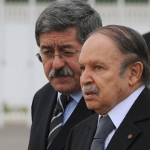Less than a year after President Abdelaziz Bouteflika’s election to a third term on April 14, 2009, Algeria is once again in political crisis. Demonstrations are disrupting vital sectors such as education and health care, while corruption becomes increasingly pervasive. This situation is not at all what Bouteflika and his supporters promised back in November 2008, when the constitution was amended to remove term limits and enable the president to stay in the office he has held since 1999. It is clear now that their true intention was to consolidate the existing political order taking advantage of the improvement in Algeria’s financial situation brought about by an exceptional rise in global oil and gas prices. This inflow of hydrocarbon revenue was used to meet pressing social demands and boost investment in infrastructure.
Political Crises but Few Alternatives in Algeria
Reports of corruption, political power struggles, and questions about Bouteflika’s health reignite speculations about Algeria’s political future.
More work from Sada
- commentaryThe Role of E-commerce in Empowering Women in Saudi Arabia: Assessing the Policy Potential
How can Saudi Arabia turn its booming e-commerce sector into a real engine of economic empowerment for women amid persistent gaps in capital access, digital training, and workplace inclusion? This piece explores the policy fixes, from data-center integration to gender-responsive regulation, that could unlock women’s full potential in the kingdom’s digital economy.
- Hannan Hussain
- commentaryA War Fueled by Hate Speech: Sudan’s Fall into Fragmentation
Hate speech has spread across Sudan and become a key factor in worsening the war between the army and the Rapid Support Forces. The article provides expert analysis and historical background to show how hateful rhetoric has fueled violence, justified atrocities, and weakened national unity, while also suggesting ways to counter it through justice, education, and promoting a culture of peace.
- Samar Sulaiman
- commentaryDisarming Palestinian Factions in Lebanon: Can a Security Experiment Evolve into Sovereign Policy?
The August 2025 government decision to restrict weapons to the Lebanese state, starting with Palestinian arms in the camps, marked a major test of Lebanon’s ability to turn a long-standing slogan into practical policy. Yet the experiment quickly exposed political hesitation, social gaps, and factional divisions, raising the question of whether it can become a model for addressing more sensitive files such as Hezbollah’s weapons.
- Souhayb Jawhar
- commentaryKuwait’s Bureaucracy at a Crossroads: Why Government Innovation Stalls and How Analytics Can Reignite Reform
Kuwait’s government has repeatedly launched ambitious reforms under Kuwait Vision 2035, yet bureaucratic inefficiency, siloed institutions, and weak feedback mechanisms continue to stall progress. Adopting government analytics—real-time monitoring and evidence-based decision-making—can transform reform from repetitive announcements into measurable outcomes.
- Dalal Marafie
- commentarySana'a: The Crisis of Chaotic Street Naming and Absent Urban Planning
The chaos of street naming in Sana’a reflects the deep weakness of the Yemeni state and its failure to establish a unified urban identity, leaving residents to rely on informal, oral naming systems rooted in collective memory. This urban disorder is not merely a logistical problem but a symbolic struggle between state authority and local community identity.
- Sarah Al-Kbat


.jpg)



